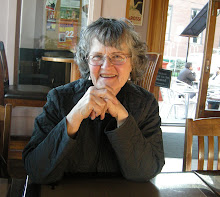BOLAND AGAIN
Even though I have finished reading Eavan Boland’s "A Journey with Two Maps" I continue to think about what she wrote and I have been rereading parts of the book.
The last chapter is “Letter to a Young Woman Poet.” This chapter moves me for its forthright and intelligent comments, and because she writes in such a personal way. When as a young seventeen-year-old girl she walked the streets of Dublin, past all the statues of Irish orators and patriots, she - as a young woman - was absorbing her culture, her history. And when she began writing poetry she “began to have an intense engagement with every aspect of writing a poem. So much so that the boundaries between the edges of the poem and the limits of the world began at times to dissolve.”
She entered into the history of poetry to such an extent that she wanted to change the past it encompassed. She wanted to eroticize the tradition so that she could make “the iron breathe and the granite move” in those historical figures past whom she had walked as a seven-teen-year old. She saw words as agents rather than “extensions of reality.” Words can change us, she concluded - could change her - rather than just recording what was happening.
She lived her life “through ordinary actions and powerful emotions. But the more ordinary a day I lived, the more I lifted a child, conscious of nothing but the sweetness of a child’s skin, or the light behind an apple tree, or rain on slates, the more language and poetry came to my assistance. …Finally, I had joined together my life as a woman and a poet. On the best days I lived as a poet, the language at the end of my day - when the children were asleep and the curtains drawn - was the language all through my day: it had waited for me.”
Boland’s life became the source of her language, and for me - a creative woman who desires wholeness in the “ordinary” parts of life and in her art, a woman who becomes fraught with the necessities of domesticity - reading about this poet for whom daily-ness becomes the source of her creative work brings me, if only for a moment, into a state of light on this dark November Sunday afternoon.
skip to main |
skip to sidebar


About Me
- Jane Lind
- I am a writer and am interested in reading and writing about the lives of women, especially artists and writers. Reading, in general, and especially women's memoirs and biographies gives me great pleasure. For many years I worked as a sculptor, along with my editing and writing, but eventually writing won out. Author of books in the Canadian Artists Series: "Gathie Falk" 1989 "Mary and Christopher Pratt" 1989 "John McEwen" 1990. Author of biographies: "Joyce Wieland: Artist on Fire" 2001 "Perfect Red: The Life of Paraskeva Clark" 2009 Editor: "Joyce Wieland: Writings and Drawings 1952-1971" 2009
No comments:
Post a Comment